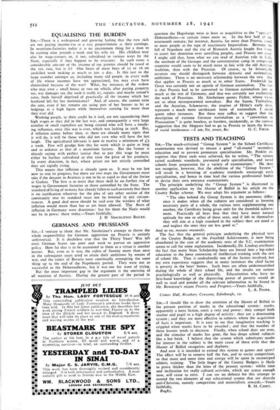GERMANS AND PRUSSIANS
venture to think that Mr. Sinsheimer's attempt to throw the whole responsibility for German aggression on Prussia is entirely unhistorical. It is doubtless true that the Thirty Years' War left most German States too poor and weak to pursue an aggressive policy. How far that is to be accounted to them as a virtue is another matter. But, even as it was, the rulers of Saxony more than once in the subsequent years tried to attain their ambitions by means of war, and the rulers of Bavaria were continually attempting the same thing up to the end of the Napoleonic period. They were not so successful as. the Hohenzollerns, but it was not for want of trying.
But the most important gap in the argument is the omission of all mention of Austria. During the greater part of the period in
question the Hapsburgs were at least as acquisitive as the " upstart, Hohenzollerns—at certain times more so. In the first half of the nineteenth century, for instance, Austria, far more than Prussia, stood to most people as the type of reactionary Imperialism. Between the fall of Napoleon and the rise of Bismarck Austria fought five time, to assert her dominion over unwilling peoples, and Prussia not once. I might add that, from what we can read of Austrian rule in Italy. the methods of the Gestapo and the concentration camp in conquered countries would seem to be much more in line with the old Austrian tradition, than with the Prussian. Of course, to be historically accurate one should distinguish between dynastic and nationalistic ambitions. There is no necessary relationship between the two. But that applies to Prussia as much as to other States. Frederick the Great was certainly not an apostle of German nationalism. The fact is that Prussia had to be converted to German nationalism just as much as the rest of Germany, and that was certainly not exclusively the work of Prussians. Mr. Sinsheimer quotes Fichte, whose views are so often misrepresented nowadays. But the Saxon, Treitschke, and the Austrian, Schoenever, the inspirer of Hitler's early day,. represent a much more unpleasant form of nationalism. I could quote other instances. But these may suffice to suggest that the description of extreme German nationalism as a " conversion to Prussianism " is quite baseless, as baseless, incidentally, as the curious suggestion that the Magyars had to go to Prussia to learn the lesson
of racial intolerance.—I am, Sir, yours, &c. G. C. FIELD.


























 Previous page
Previous page